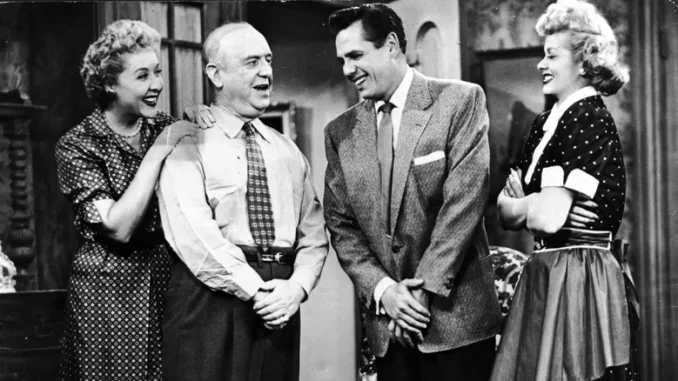
More than three decades after her passing, I Love Lucy icon Lucille Ball continues to fascinate fans — not only for her legendary career but also for the lingering questions surrounding her health in her final years. Now, a forensic pathologist has revealed surprising new details about the comedian’s cause of death, including claims that Lucille Ball had been using “poppers” to ease chest and heart pain before she passed away in 1989.
The revelation sheds light on the little-known circumstances leading up to Ball’s sudden medical crisis, painting a picture of a woman who had been quietly battling heart issues while still maintaining her trademark humor and energy.
The Shocking Details Behind Lucille Ball’s Final Days
Lucille Ball died on April 26, 1989, at the age of 77, after suffering a ruptured aortic aneurysm just eight days following emergency heart surgery. Though her death was widely reported as a tragic but natural medical event, new insights suggest there may have been more to the story.
According to a forensic analysis featured in a recent medical documentary, experts now believe that Ball’s use of poppers — inhalant drugs that dilate blood vessels and produce a brief “rush” of relaxation — may have been her way of managing recurring chest pain caused by worsening cardiovascular disease.
“Lucille Ball was known to have experienced chest and heart discomfort in her later years,” said Dr. Michael Hunter, a board-certified forensic pathologist. “It’s believed that she may have used poppers, likely without understanding their potential impact on her already fragile heart.”
What Are “Poppers”?
“Poppers” are a slang term for alkyl nitrites, chemicals inhaled for short-term effects like lightheadedness, warmth, or muscle relaxation. While they are sometimes used recreationally, these substances can also have dangerous cardiovascular effects — particularly for individuals with preexisting heart problems.
“They work by dilating blood vessels and reducing blood pressure,” Dr. Hunter explained. “But for someone with an aneurysm or other structural heart issue, that sudden change can trigger a catastrophic rupture.”
If Ball was unknowingly using them to self-medicate chest discomfort, the added strain could have worsened her condition in the days leading up to her fatal heart event.
Her Health Struggles Hidden from the Public
Despite her immense fame, Lucille Ball kept her health issues private. Friends and colleagues described her as fiercely independent — unwilling to slow down even as she entered her late seventies.
She was still active in the entertainment industry, making public appearances and even planning new projects at the time of her surgery. But according to medical reports, Ball had a long history of hypertension and aortic problems, both of which were likely aggravated by years of stress and a relentless work ethic.
“Lucille was a perfectionist,” said one former colleague. “She gave everything she had to her career. She wasn’t the type to admit weakness, even when she was in pain.”

The Surgery That Couldn’t Save Her
On April 17, 1989, Ball underwent a 10-hour open-heart surgery at Cedars-Sinai Medical Center in Los Angeles to repair a dissecting aortic aneurysm. The procedure initially appeared successful, and reports at the time claimed she was in good spirits during recovery — even joking with her nurses.
However, just over a week later, she suffered a sudden aortic rupture, which caused internal bleeding and cardiac arrest. Despite emergency efforts, she was pronounced dead early that morning.
Dr. Hunter noted that if Ball had been using poppers for pain relief during this period, the drug’s vasodilating effects could have weakened her already delicate artery walls.
“It’s a tragic irony,” he said. “Something she may have thought was helping ease her pain could have actually hastened the end.”
Remembering a Legend
While these revelations offer new medical insight, they don’t change the legacy of Lucille Ball — a woman who revolutionized television, broke barriers for women in comedy, and left an indelible mark on pop culture.
Her pioneering work in I Love Lucy not only made millions laugh but also changed how television was made — introducing innovations like multi-camera filming and live-audience laughter that shaped sitcoms for decades.
“Lucille Ball was unstoppable,” Dr. Hunter reflected. “Even in her final years, she was still the powerhouse the world knew her to be. Her health struggles were hidden behind the same strength and grace that defined her career.”
What This Means for Fans and Medicine
The forensic findings serve as both a historical revelation and a modern-day health warning. Self-medicating — even with seemingly harmless substances — can carry serious risks, especially for those with chronic heart or vascular conditions.
“Lucille Ball’s case is a reminder of how important proper medical guidance is,” Dr. Hunter said. “Even something that feels like temporary relief can have devastating effects when mixed with underlying disease.”
Final Thoughts
Lucille Ball’s story remains one of resilience, love, and laughter — but her death also highlights the hidden struggles of aging stars who continue to push themselves long after the spotlight fades.
While the new forensic insights are sobering, they also deepen our understanding of her humanity — a reminder that even icons have vulnerabilities.
In the end, Lucille Ball’s brilliance outshines the tragedy. Her laughter lives on in every rerun of I Love Lucy, her spirit in every comedian who dares to lead with heart. And though her final days may have been shadowed by pain, her legacy remains as radiant as ever — proof that laughter truly can outlast everything, even heartbreak.